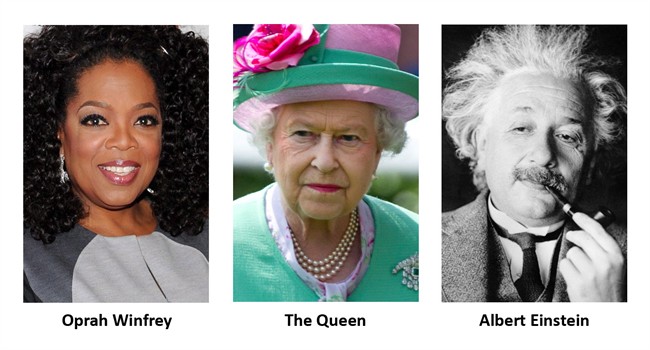TORONTO – For most people, seeing a picture of a famous face – Oprah Winfrey, the Queen or Einstein, for instance – sparks immediate recognition and brings the name readily to the lips.

But for people with a rare form of early-onset dementia called primary progressive aphasia, or PPA, the ability to identify a face or the person’s name can be impaired.
PPA strikes people aged about 40 to 65, much earlier than is typical for other forms of dementia like Alzheimer’s disease.
The condition is characterized by a deterioration in language and eventually the ability to communicate, although initially cognitive function in other areas remains intact, said Tamar Gefen, a PhD candidate in clinical neuropsychology at Northwestern University in Chicago.
“Memory is fine, attention is fine and their planning, their judgment, their personality, their emotions – they’re intact,” explained Gefen, adding that early symptoms can include being unable to recall the names of familiar people or in some cases everyday objects.
“Someone will come in and say: ‘I can’t remember my co-worker’s name. I see her every day and I cannot remember it,”‘ she said.
As the disease progresses, the person has difficulty speaking coherently and eventually stops talking altogether.
Since the inability to put a name to a face can be an early sign of Alzheimer’s disease, Gefen said it’s important to properly diagnose the cause using specific tests that can identify PPA.
However, standard tests for face recognition and naming put together in the 1970s, ’80s or even early ’90s may be outdated for some people in their 40s, who may not be familiar with images of people who became household names during or before that period.
So Gefen and colleagues compiled a set of 20 famous faces – among them Winfrey, Bill Gates and Princess Diana – that may be more relevant for middle-aged patients, and tested them in a study reported in Tuesday’s issue of the journal Neurology.
“The famous faces for this study were specifically chosen for their relevance to individuals under age 65 so that the test may be useful for diagnosing dementia in younger individuals,” said senior author Emily Rogalski of Northwestern’s Cognitive Neurology and Alzheimer’s Disease Center.
The researchers showed the black-and-white photos to 30 subjects with primary progressive aphasia and to 27 healthy control subjects without dementia, all with an average age of 62, to determine their ability to recognize and then name the famous faces.
Participants were given points for each face they could name. If the subject could not name the face, he or she was asked to identify the person through description. Participants gained more points by providing at least two relevant details about the person.
“For Oprah, you’d say, ‘Oh, I know she’s really famous and she’s rich and she has a talk show and she’s been in movies,’ but you just can’t come up with that name,” said Gefen.
Researchers found that PPA subjects performed significantly worse on the test, scoring an average of 79 per cent in recognition and 46 per cent in naming the famous faces versus 97 per cent in recognition and 93 per cent in naming achieved by control subjects.
“An important component of the test is that it distinguishes deficits in remembering the name of a famous person from that of recognizing the same individual,” noted Rogalski.
Using MRI scans, researchers found that people who had trouble putting names to faces were more likely to have a loss of brain tissue in the left temporal lobe, while those with trouble recognizing faces had tissue loss in both left and right temporal lobes of the brain.
“So those two processes, naming versus recognizing, are actually very distinct and sometimes they’re lumped together,” said Gefen.
“It has clinical significance for neurologists. Now they can give this test and they can predict that if they have naming problems, then that’s probably a left-sided problem. But if they have recognition problems, then it’s probably a bilateral problem.”
Dr. Sandra Black, a neurologist at Sunnybrook Health Sciences Centre, said the dementia clinic at the Toronto hospital uses an informal group of photos geared to Canadian patients. Like the Northwestern list, it includes Winston Churchill, Elvis Presley and Albert Einstein, but not Gates or former U.S. presidents Bill Clinton and George W. Bush.
“The problem with famous faces is it really depends on how politically aware the person has been or what their particular hobbies or interests are,” said Black, director of brain sciences research.
“I think the more telling thing is you ask (a family member) if your loved one is having any difficulty recognizing people they know,” such as friends or relatives the person doesn’t see very often, she said. “That’s another way of getting a sense of this.”
Still, Black said the study “provides a nice little packaged test” that smaller hospitals less familiar with PPA could administer to patients having word-finding difficulties, along with other neurological assessment tools.
“And I think that’s a contribution … It’s bringing attention to a disease that may seem a bit bizarre: How can you lose the meaning of faces and words? How could you lose the ability to name people that you know?”
The reason is that PPA is caused by degeneration of neurons in the temporal lobes of the brain, located behind the eyes, which are responsible for speech and language.
There is no treatment for PPA, a form of frontotemporal dementia, and it’s not clear how common the condition is within the population.
The disease can be devastating for the person affected and their families, said Gefen, who earned her undergraduate degree at McGill University in Montreal.
“Humans are social beings. If we can’t recognize, we can’t communicate, we can’t interact … If you can’t notice a loved one in a crowd, you get lost, but you also get completely disoriented about yourself.
“It’s terrible. I’ve seen so many PPA patients and it breaks my heart. It’s really sad.”


Comments